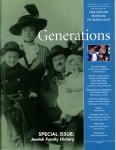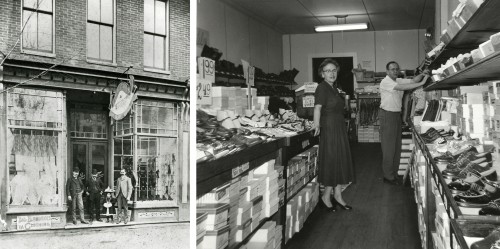Second Cousins, Card Parties, and Chickens in the Back Yard Part II

 Article written by Deborah R. Weiner, former JMM research historian and family history coordinator. Originally published in Generations – Winter 2002: Jewish Family History. Information on how to purchase your own copy here. Many thanks to JMM collections manager Joanna Church for re-typing this article.
Article written by Deborah R. Weiner, former JMM research historian and family history coordinator. Originally published in Generations – Winter 2002: Jewish Family History. Information on how to purchase your own copy here. Many thanks to JMM collections manager Joanna Church for re-typing this article.
Part II: The Family Business
Miss the beginning? Start here.
Most Jews who followed their pioneering relatives to rural areas, however, did not arrive to fill a specific communal need. More typically, they came because of economic opportunity, enticed by their predecessors who either offered them jobs in growing small-town stores or regaled them with tales of the potential for small business. One such conversation brought the Hirsh family to Bel Air in the 1920s. Explained Hannah Hirsh Cohen, “My father’s brother said, ‘Ben, there’s a little town near where I work … It’s a nice little town and they could use another good tailor there’ … So mother and dad came here and they looked the town over and they decided to stay.” The result was often a network of related Jewish family stores. On the Eastern Shore for example, Fox family variety stores could be found in Easton, Chestertown, Federalsburg, Princess Anne, and Hurlock.[1]

The family business (with an emphasis on “family”) formed the cornerstone of small-town Jewish existence, in contrast to large cities such as Baltimore, where family businesses vied with the garment industry and, later, the professions as a major source of employment. For Jews who settled in small Maryland towns, economic life and family life were fundamentally joined. Not only did extended family ties provide a critical source of business opportunities, partnerships, loans, and jobs, but the businesses founded by Jewish entrepreneurs invariably centered around the immediate family – and the family’s daily existence centered around the store. Husbands, wives, and children all pitched in. Children grew up in the store, and often inherited the business upon reaching adulthood.
Stories of Maryland’s small-town Jews abound with references to the family store. Growing up in Chestertown, Ruth Fox Schreter recalled, “We all had to work in the store, we all worked together and as soon as I came home from school, I knew that’s where I’d have to be.” Like many others, Abe Weiner’s family lived above their store during his St. Mary’s County childhood in the 1920s. His mother spent seven days a week in the store – and nights also, especially after her husband’s premature death in 1930. When Goodman’s general store celebrated 100 years at its Eastern Shore location in 1994, the local newpaper noted the continuous family involvement of four generations of Goodmans in the day-to-day operations of the business. A relative later wrote that Ethel Goodman, daughter-in-law of store founder William Goodman (and daughter of Faivel Heilig), “went to that store every workday” from the mid-1920s until the store closed shortly after the anniversary.[2]
Continue to Part III: Social Visiting
[1] Hannah Hirsh Cohen, interview with Karen Falk, Bel Air, Md., 8 November 2000 (JMM OH 0388); Natalie Fox Jeffrey, interview with Jane Cohen, Baltimore, 7 February 2001 (JMM OH 0448).
[2] Ruth Fox Schreter, interview with Jane Cohen, Cockeysville, Md., 23 August 2000 (JMM OH 0356); Abe Weiner, interview with Jane Cohen, Baltimore, 4 April 2001 (JMM OH 0466); “Goodman’s Marks 100 Years in Snow Hill,” Snow Hill Express, May 4, 1994; Rita Krakower Margolis, “Why Pocomoke City, Maryland?”, Mispacha (Winter 1996): 13.
